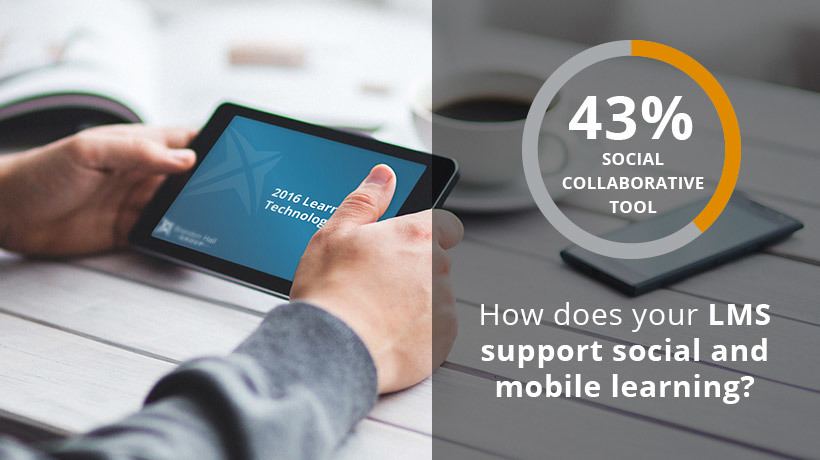Social And Mobile Learning: Why More Companies Are Shifting Toward Them
A recent study by eLearning analysts at Brandon Hall Group uncovered the five learning technologies organizations are looking to implement in 2016. Not surprisingly, social and mobile learning solutions, which have steadily grown in popularity, topped the list of priority Learning and Development investments this year.
With 2.3 billion people across the globe using social media and over half of web traffic now coming from mobile devices, it makes sense for the eLearning industry to look to these avenues for opportunity.
Let's take a look at an excerpt from the complete study, available exclusively from Docebo, and explore the five most sought-after technologies, and find out why so many organizations are asking for them.
"Brandon Hall Group has been researching learning technology for years, and mobile and social have been steadily climbing the priority list. Now, they sit firmly on the top, and organizations are hungry for platforms that leverage new technologies to allow for a more 'just-in-time, just-for-me' learning experience."
Just why are these social and mobile learning tools so desired? Because of the tremendous value “just-in-time and just-for-me” training can provide. These tools represent a dynamic shift in how training is delivered.
Blended Learning For Better Retention
For years, professional Training and Development relied heavily on formal learning approaches such as classroom instructor-led training. Although this approach is useful, it isn’t very effective by itself. In fact, retention rates drop to 10% just a week after a training event.
Paring formal learning with these new social collaborative tools and mobile delivery can reinforce the training and greatly increase retention rates.
Social learning tools can ensure learning doesn’t end at the conclusion of a webinar or training session. Learners can use social tools such as FAQs and internal discussion forums to bolster training materials. The formal training can introduce a concept. Social learning can show how that concept is actually implemented in the workplace.
"When it comes to technology-enabled informal learning, more than half of companies consider discussion forums and collaboration platforms as either essential or critical to the business."
Learning On-The-Go
Mobile learning allows learning to happen anywhere, or more specifically, it allows learning materials to be consumed at the point of need. Again, this new capability can greatly support knowledge first introduced in a formal setting.
A salesperson may not remember every detail of a new product after an annual sales kickoff event. They can utilize mobile learning to watch a quick refresher video or view a features slide-deck on the way to a sales call to make sure they can properly prove value propositions to a new client. These micro-learning activities offer an opportunity to quickly reinforce formal training.
Organizations know these technologies are worth the investment. According to Brandon Hall Group:
“Companies are... spending averages of 4.7% and 4.3% on social and mobile technologies, respectively. That’s on top of the money they are already spending on their LMS, and more than one-third of companies expect those percentages to grow over the next year.”
The Need For Better Tools
Just why do so many organizations expect to spend more on learning technologies? Because they haven’t found the solutions they desire in the market yet.
"When 46% of companies consider discussion forums essential and 8% consider them critical to the business, it’s a significant problem when only 5% say they are very satisfied with the discussion functionality of their current platform."
This dissatisfaction trend continues with all other informal learning technologies. According to the study, the current approaches to informal learning are not fulfilling market needs.
With satisfaction levels all well below passing grades, it’s no surprise Brandon Hall Group reported 48% of organizations are seeking a new or different Learning Management System The power of these technologies is well proven. Employing a blended learning strategy that reinforces formal learning with social tools can create an entire culture of learning at an organization.
Thankfully, some eLearning organization are listening to these demands and answering with a host of powerful solutions. Docebo recently added social and mobile learning capabilities to the corporate Learning Management System that can greatly improve an organization’s learning strategy.
The new Coach and Share module allows organizations to tap expert knowledge within and creates channels for peers to learn from each other. New mobile apps, available for iOS and Android, deliver the full power of the Learning Management System to mobile devices.
Download the full report to ensure your organization has the right tools for training success.









